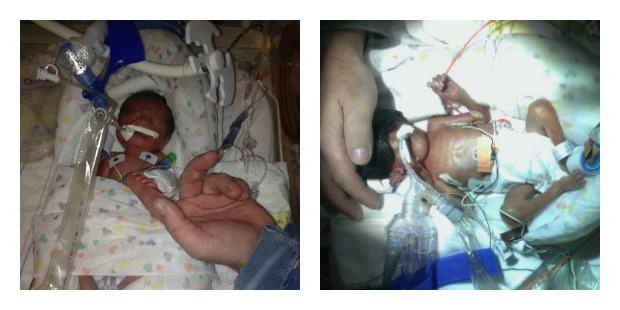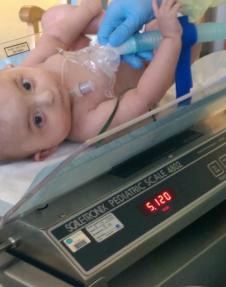Michael’s Story
No one could explain to Kerri Kostecki why a healthy mom with a healthy baby was suddenly in labor at 24 weeks. It happened so unexpectedly. One day Kerri was visiting with friends, registering for her baby shower, and the next she found herself in an ambulance on route to Brigham and Women’s Hospital, where she was immediately admitted.
Kerri and her husband Ryan passed what seemed like an interminable period of bed rest by poring over the statistics their child faced. They were grateful for each passing day, because it provided a higher likelihood of survival and a lower likelihood of disability.
At 26 weeks, the wait was over, and Michael was born with the odds mostly on his side, but as a “micro preemie,” he had a long struggle ahead of him.

Ryan remembers, “In the hours after his birth, we wondered if he would make it through the day”. As they watched their “little guy” strain under the effects of his prematurity, the couple says fear and exhaustion rocked them. 133 days in the NICU. Three surgeries. Seven close calls. Infections with difficult to treat bacteria. Countless tests and procedures.
“In the hours after his birth, we wondered if he would make it through the day”
Little Michael astounded his parents. They supported him as he “fought with the strength of 100 men” until finally the time had come, and he was ready to go home. Kerri was happy to have saved six weeks of vacation time to finally enjoy a maternity leave with her baby.
Michael made good progress at home and the Kosteckis were just settling into a nice routine when, in the early spring, they received the shocking diagnosis that Michael was struggling with pulmonary hypertension, a type of high blood pressure that affects the arteries in the lungs and the right side of the heart. Little did they know, their baby was not getting enough oxygen, especially at night, and his heart was working on overtime. To ensure he could always and easily have ventilator support, the safest solution was a tracheostomy.
It was a move that would dramatically affect their son’s early childhood years, decreasing his independence in many ways, but it was definitely going to increase his health and ensure his safety, which lessened the blow. After the surgery, the Kostecki’s new focus became bringing him home again. And that is when the family learned about The Magic Number. Five. A baby needs to be 5 kilograms—that is eleven pounds—to qualify for home equipment. So, literally, Michael came to Franciscan Children’s to grow.
Michael came to Franciscan Children’s to grow.
And to smile; and to hold his nurse’s hand; and to nosily track every visitor to his room, curious about everything. During this time, Kerri diligently provided breast milk to support his immune system, and supplemented with formula to ensure he’d take in a full 34 calories with every ounce of his feeding. His parents credit Franciscan Children’s dedicated team of physical therapists, occupational therapists, and speech therapists for getting Michael back on track after surgery and ensuring he continued to progress toward his developmental milestones.
The baby books Kerri and Ryan Kostecki had read did not explain how to care for a baby with a trach. Actually, the baby books hardly prepared them for many of the challenges of caring for their little boy Michael. The couple credits caring nurses and healthcare workers at Franciscan and area hospitals with helping them master all of his cares.
They are very grateful for the excellent care and attention he received during his nearly six-month stay at Franciscan. “Everyone knew his name,” Kerri remarked in a recent interview. “Family visited one day, and I hadn’t given them correct directions, and a handful of people on Unit 2 said, ‘Oh, no, Michael is on Unit 3!’ Franciscan is wonderful in that way.”

Born at only 26 weeks, an impossibly tiny 1 lb. and 12 oz., Michael Kostecki definitely had a lot of growing to do. But his parents believe that his determined spirit has definitely made all of the difference. Today, at seventeen months old, Michael’s pulmonary hypertension has completely resolved. And he is reaching plenty of new milestones: sitting up, rolling over, breathing on his own off the ventilator during the day. He even recently served as a junior usher in a family wedding, being pushed down the aisle in his stroller. As Michael continues to progress, the Kostecki family looks forward to him outgrowing the need for his g-tube and trach altogether.
Want to share your story? Send it our way to stories@fhfc.org.
Explore All Stories